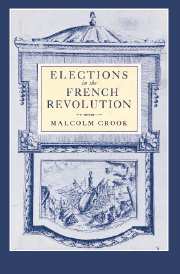Book contents
- Frontmatter
- Contents
- List of maps
- List of tables
- Acknowledgements
- List of abbreviations
- Introduction
- 1 Subjects to citizens? The elections to the Estates General and the Revolution
- 2 Limits of citizenship: The franchise question, 1789–1791
- 3 Biting on the ballot: From enthusiasm to abstention, 1790–1791
- 4 One man one vote? The experiment with electoral democracy in 1792
- 5 Voting the Constitution: The referenda of 1793 and 1795
- 6 Parties, schisms and purges: Elections under the Directory, 1795–1799
- 7 An invisible aristocracy? The departmental assemblies and the emergence of a new political class
- Conclusion
- Bibliography
- Index
3 - Biting on the ballot: From enthusiasm to abstention, 1790–1791
Published online by Cambridge University Press: 03 November 2009
- Frontmatter
- Contents
- List of maps
- List of tables
- Acknowledgements
- List of abbreviations
- Introduction
- 1 Subjects to citizens? The elections to the Estates General and the Revolution
- 2 Limits of citizenship: The franchise question, 1789–1791
- 3 Biting on the ballot: From enthusiasm to abstention, 1790–1791
- 4 One man one vote? The experiment with electoral democracy in 1792
- 5 Voting the Constitution: The referenda of 1793 and 1795
- 6 Parties, schisms and purges: Elections under the Directory, 1795–1799
- 7 An invisible aristocracy? The departmental assemblies and the emergence of a new political class
- Conclusion
- Bibliography
- Index
Summary
The first and last legislative elections to be held under the Constitutional Monarchy, during the summer of 1791, produced a poor turnout; thereafter abstention became endemic. It is tempting to blame the electoral system for this disappointing trend. Yet the local elections of 1790 had often attracted a majority of the electorate, especially in rural areas. In 1791, by contrast, the context of disaffection and discontent in which citizens were asked to vote clearly began to take a toll on the level of attendance. Frustrated in their expectations of change and dismayed by the emergence of religious divisions, voters began to desert the polls en masse. Abstention was a product of more than just ignorance or indifference but, before any serious attempt is made to explain why turnout plummeted after 1790, an effort must be made to determine more precisely the degree of participation.
This is far easier said than done, for the historical psephology of the revolutionary period cannot pretend to be an exact science in the same way as contemporary electoral studies. In one respect there are too few statistics: with the exception of the two constitutional referenda (or plebiscites) of 1793 and 1795, no endeavour was made to collect returns at the national level. This is indicative of governmental indifference and ineptitude where the electoral process was concerned, but above all it reflects the practice of indirect elections in which the primary stage was considered a purely local matter. Yet the conservation of relevant procesverbaux in municipal and departmental archives leaves a great deal to be desired. Though fuller documentation is usually available for larger towns, few rural communes have preserved a set of records for the whole decade.
- Type
- Chapter
- Information
- Elections in the French RevolutionAn Apprenticeship in Democracy, 1789–1799, pp. 54 - 78Publisher: Cambridge University PressPrint publication year: 1996



